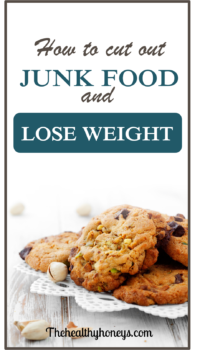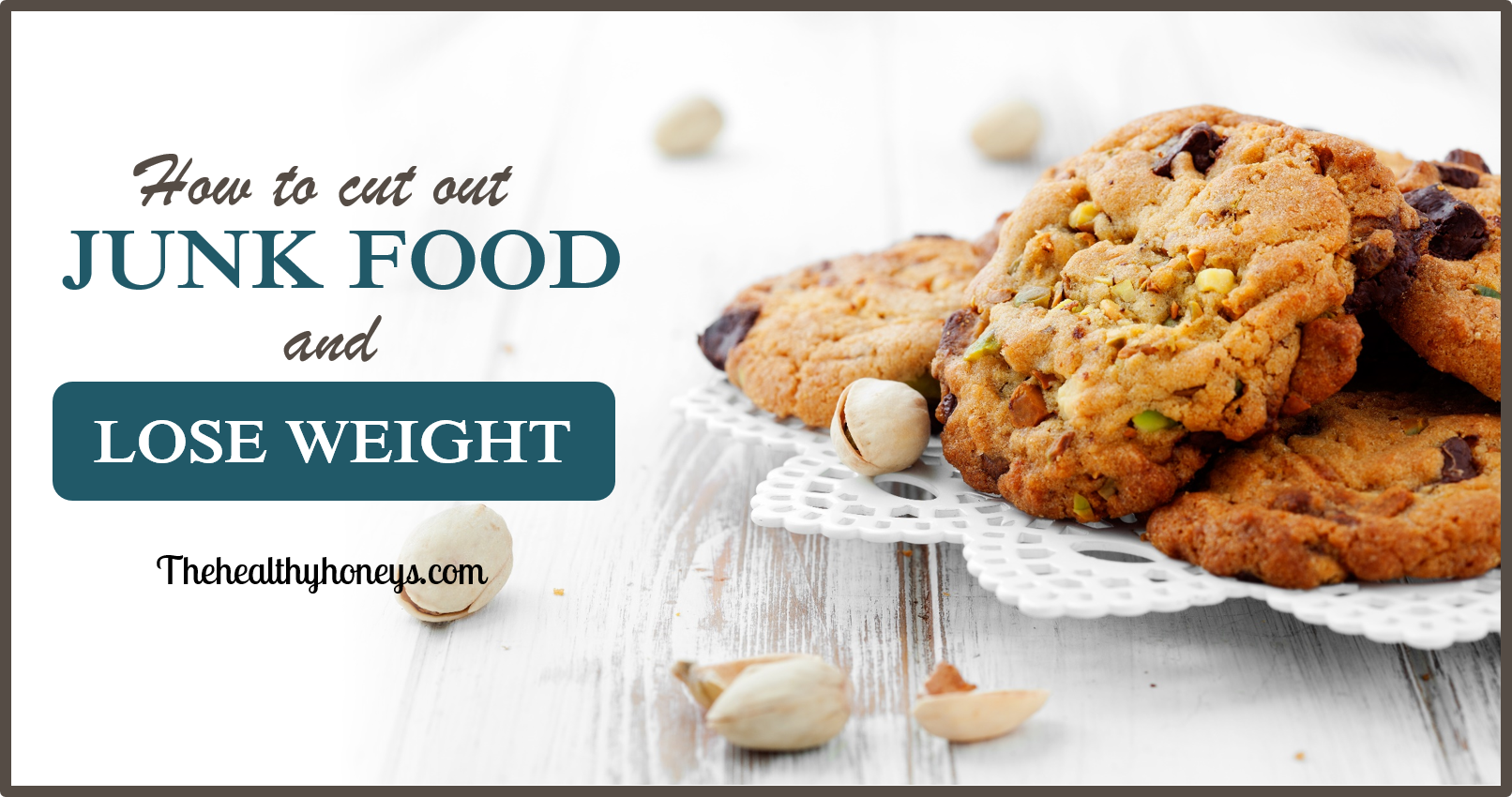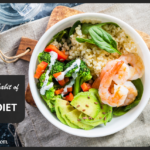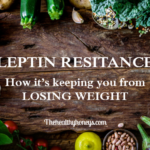How to Cut Out Junk Food
It can be very difficult to cut out junk food. Let’s face it, it is in our faces at every turn, whether it’s at a get-together, or just strategically placed at the checkout. It is present and convenient to grab when we are at our weakest. Ultimately certain foods just need to be cut out of the diet or eaten very sparingly; meaning once a month or something similar. There is nothing wrong with eating junk food occasionally at a party or social gathering but not for our day-to-day eating habits. Cutting junk food out of our daily eating habits is an essential part of losing weight and being healthy.
Biggest Junk Food Offenders
- Extra sugar: We consume extra sugar in so many forms these days. Sodas, juices during meals, in our sweets, in our condiments, or just eating extra sweet treats. Switch out your soda for water at meals. Instead of having fruit juice, eat the whole fruit. Skip out on the cookies or cake and have some fruit instead. Cutting out extra sugars will not only help you lose weight but will greatly improve your health as well. Decreasing your sugar intake decreases inflammation, increase your energy levels, regulate your blood sugar, decrease insulin-resistance, prevent diabetes, and decrease obesity. This includes:
- Cutting out Soda
- Sugary desserts
- Bad fats: Bad fats can also cause inflammation. The best fats for weight loss include olive oil and coconut oil. Healthy fats include butter and tallow from grass-fed cows. Unhealthy fats include margarine, soybean oil, and vegetable oil. Read more about saturated fats here.
- Processed foods: Foods bought from the grocery store in a box or a can usually are loaded with way too much salt, sugar, and preservatives. Cooking from scratch is a great way to know exactly what is in your food.
- Fast Food: Fast food is generally very high in calories, trans fat, and simple sugars. Skipping out on the fast food can go a long way for our health.
Why Do We Eat Junk Food?
Cutting out junk food is not always easy. Whether it’s the fruitcake that we traditionally make for the Christmas season or the Oreos and milk that is our go-to feel-good snack. The emotional attachment and cultural attachment we have to food can make it difficult to make changes in our diet and let go of some of the unhealthy foods we eat. That is why diets are so often prone to fail. Generally speaking, we can’t just make this transition all at once and have anything last more permanently. Nor should we completely disregard our emotions and cultural influences that drive us to eat these foods. I believe food has a bigger role in our lives than simple nourishment (but that is for another post). When we take cutting out junk food more slowly we can find things to replace it. Instead of going to Oreos for a comfort food we can find other healthier alternatives such as protein bites or yogurt.
Habit
Our habits often shape us. When we consciously follow a diet plan or make efforts to buy healthier food and rid our cupboards of the unhealthy stuff we can easily change our habits. Are we eating junk food just because that is what we have gotten into the habit of buying? This may be the case, but it is more likely caused by some of these other factors below.
Leptin Resistance
Leptin is the hormone that our fat cells produce to tell our brain that we aren’t hungry and can stop eating. Unfortunately, many people today have leptin resistance. Our Brains are flooded with so much leptin that it stop recognizing it and we still crave food. If you have a lot of belly fat you are most likely leptin resistant and will find yourself craving high sugar high-fat foods. Leptin resistance is a vicious cycle because when our brain gets in starvation mode it starts working overtime to get us to conserve energy and build up fat stores because it thinks we are starving. Our brain makes us feel lethargic and crave food when it isn’t registering the leptin. Ironically the things we need to do to reverse leptin resistance are many of the things that are associated with good health.
- Get enough sleep
- Lessen our stress
- Eat a good amount of protein
- and get good exercise.
This hormone and the way it functions in our body pretty much determines that no quick fad diet will work without us instituting healthy habits in our life. If we want to lose weight with a crash diet we will almost certainly gain the weight back because we will be fighting with our bodies own survival mechanism. Once the weight is lost we will respond to the lack of Leptin and regain everything back. Incorporating and dealing with leptin resistance will help us maintain lasting weight loss and healthy habits in our life. You can read more about leptin and it’s companion hormone Ghrelin here.
Emotional Eating and Food Addiction
We often turn to junk food when our emotions run high, or we’re lonely, or we need comfort. Sugar and fatty foods are our friends. They make every party more fun and every setback more bearable. It’s no wonder that cutting out junk food can be so difficult when it plays such a vital role in our life. Right? Sometimes we have to deal with the emotions first. Check out my emotional eating article in this healthy habits series.
You may be surprised to realize that food addiction and emotional eating are almost one in the same. Poor relationships and an unfulfilled life are closely correlated with addiction. Find joy and meaning in our endeavors and relationships can go a long way in ridding ourselves of the desire to turn to food for comfort and joy.
I also really love this article from Harmony Restored about finding joy before giving up sugar. This article resonated so much with me. I really feel like what we weigh is more a result of our life than it is some superfood. I think that is why quick diets don’t work… because what we eat on a daily basis is more than just plans and motivation. If we can fill our life with healthy things that give us comfort, joy, and fulfillment instead of sugar and junk food.
Here are four steps to overcome emotional eating:
First: Notice when you want to eat junk food or tend to overeat. What is triggering you? I often grab a handful of chocolate chips from my cupboard when I’m stressed with my kids. That is my emotional eating food.
Second: Try to find a replacement for that situation. It doesn’t have to be food but can be. For example, I can write in my journal or run up and down my stairs when I get overwhelmed. Or I can replace my chocolate chips with a chocolate protein shake instead.
Third: Follow through and re-assess. At the end of the week or day see if it worked and if you need to find a different replacement. Does writing in your journal really help calm your feelings or do you need to find something else? It may be that you just need to work harder to develop that habit.
Fourth: Focus on finding and building meaningful relationships and activities in your life that build you and don’t stress you out.
Social and Cultural Pressures
Food is a huge part of every culture. It’s present at nearly every social gathering. Food is ingrained in traditions the world over. Our lives are integrated with food in a beautiful and profound way. Food can and should be a part of our traditions and culture. When we start shying away from social events or disengaging from our culture we may be developing an unhealthy relationship with food. We also need to recognize that if we cave to every social or cultural pressure it may not be the best for our waistline or our weight loss. Learning to take one thing and watch portion sizes at events and parties is critical to eating less junk food. It is easy to use a social situation to binge eat our sugar. We would be better served by just taking one dessert or cookies and then restraining. During the holidays we would be better served by celebrating with all the goodies for one day we celebrate instead of a full month. For example, during Christmas, we can indulge for Christmas Eve and Christmas day but for the rest of the season keep the goodies out of the house. And again watching portion sizes of these sweet treats and goodies is very important.
Another important part of dealing with social pressures is dealing with people that are pressuring you to eat more than what you really want. A good way to deal with this is by delaying. Susie says “You have to try my cheesecake it is so good!” You reply “Oh that sounds delicious. I can try it later”. Then you can keep delaying or if you really want a small piece you can try it on your own terms.
Here are some tips for managing social events with food:
- Eat something small and healthy beforehand
- Take the small piece of cake.
- Avoid the refreshment table.
- Offer to bring a healthy side or snack.
- Enjoy a rare treat without guilt.
Other Posts in Our Healthy Habits Series:
- Sleep
- Addressing Emotional Eating
- Fueling our bodies with nutritious meals, with plenty of fruits, veggies, and good protein
- Controlling our blood sugar.
- Proportionate meals
- Discover a type of movement that inspires and invigorates us
- Make exercise a daily ritual
- Managing time to feel and be productive
- Take an inventory of my emotional health
- Time management
- Positive self-talk
Like this post? Please share it by:
Pinning it here!









[…] to, but you should look to cut foods that are really bad for you, like junk food, from your diet. TheHealthyHoneys tips on this could really help you to do it and feel the […]